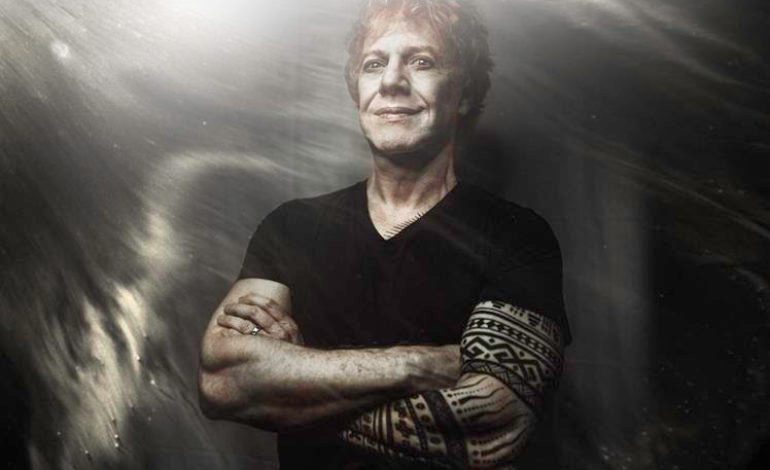

The first thing you’ll notice at a Danny Elfman show at the Hollywood Bowl is a crowd of tens of thousands, many of which are divided up into sections of four people, huddled up into what looked like wood and steel crates. A couple dozen musicians stood on stage, which is an odd sight for a concert, but then again Elfman has become an iconic “odd” musical figure, especially in recent years.
Elfman stood in the front row, flanked by a couple rock band members, followed by percussion and other classical/film score musicians behind him. In pure musical terms, the innovation is really the use of occasional classical percussion in combination with the typical rock setup.
The electric songs of Elfman have been in the news more recently. As the lights dimmed, the audience applauded. During these songs, the acts featured heavy feedback and a large screen graphic. Elfman stood in the middle of the stage, looking more like a Jokerman, or the Joker, as he screamed into the microphone and pounded against the drums.
For fully electric songs like this, there almost seems to be little musical need for the more classical elements his previous incarnation was known for. When one closes their eyes it is hard to even tell that there is any other instrument than Elfman’s profanity-laced screams and the lead guitar and drums.
A highlight was a brief section of the Spider-Man theme that Elfman is particularly famous for. The performance did not feature any rock instruments. It’s feasible that the set up of sometimes jumping between heavy rock and classical pieces is part of Elfman’s attempt to please the audience just enough with the familiar before pushing them to see his own vision.
What is striking is the sincerity of Elfman’s new direction. It isn’t easy to describe exactly why someone is believable or not when they adopt a unique image after being a staple of a previous one. There is a certain look in his eyes that gives the impression his primary concern is not with how the audience perceives this new direction.
Another fan favorite was “Just Another Day,” from his Oingo Boingo days, which was one of the bigger crowd reactions among the rock songs. Between these major crowdpleasers, Elfman thanked the audience for being at the first solo set he has played since Coachella.
Most memorable of his audience interactions was his declaration, aware of his perhaps shocking image in light of his previous reputation as a film scorer, that “For better or for worse, this is me.” The audience and Elfman seemed to connect on a point beyond music then, to one of musical identity as an extension of general identity. Even in his speaking to the audience, the authenticity in his voice and expression seemed a foil to much of the larger artists these days.
Elfman returned to his “Oingo Boingo” roots during the performance, not only in genre but, to some degree, in arrangement. The new wave band went through multiple lineup changes, and at times, consisted of dozens of band members. This performance also featured dozens of musicians, with most of them seemingly for the film composition sections, and a few core band members for the rock band.
Elfman has time and time again demonstrated himself as one of the few musical chameleons of our era, starting off in street theater with his brother Richard in the early lineups of Oingo Boingo, moving to new wave rock music, through film composition and now returning to a rock band setting that is even more aggressive and energetic than before.
Artists like Bob Dylan, Linda Ronstadt and Paul McCartney were examples of musicians that excelled in multiple genres, which seems to be less common in recent years. One exception is Rostam, formerly of Vampire Weekend, who has recently explored not only the popular rock sound but Persian roots, and classical elements in recent songs. Otherwise, Elfman stands alone in his musical versatility.
Witnessing the back and forth onstage between hard rock songs and film scores, both of which were well received by the audience, is a refreshing experience for a listener. Oftentimes, even the best bands stick largely to one signature style that sometimes grows stale in a setting where one is to listen for hours at a time but Elfman is a dynamic performer, keeping his audience on their feet at all times.
Elfman has primarily been featured in Tim Burton films, and has consistently worked closely with filmmakers such as Sam Raimi. The range even within Elfman’s film scores is quite impressive, ranging from the Fifty Shades of Grey franchise to Pee-Wee’s Big Adventure.
Even early songs from Oingo Boingo foreshadowed an interest in a wide range of music. For example, the band’s hit “Dead Man’s Party,” features an extensive brass section and percussion. Similarly, the Hollywood Bowl show featured percussion in particular, with a line of percussionists gracing the stage.
Overall, the experience of seeing a musician that is perhaps most recognized for film scores commanding the stage in front of dozens of rock and classical musicians, dressed up in white and grey body paint, is a refreshing musical experience. Elfman takes the audience beyond the pure entertainment value of the visual spectacle. He offers a sense of integrity and authenticity, clearly following his own muse and musical instinct. Elfman is a rare exemplar of the trait which has defined many of the memorable musicians of any genre throughout American history, and that is the willingness to follow himself. The audience’s very positive reaction might just be the cherry on top.
